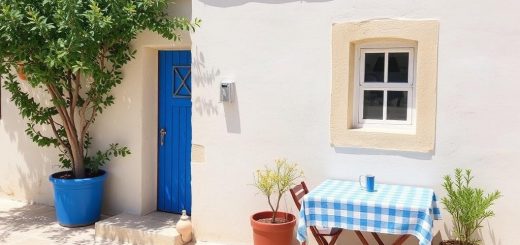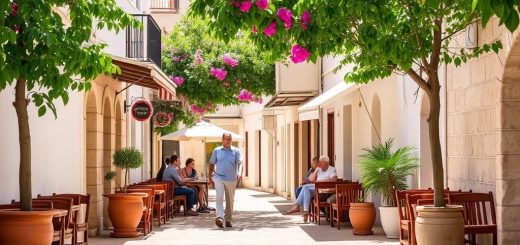Cyprus Folk Beliefs and Superstitions: Cultural Insights
The island of Cyprus, with its rich history and diverse cultural tapestry, offers a fascinating glimpse into a vibrant world of folk beliefs and superstitions that have shaped everyday life for centuries. These traditional superstitions Cyprus residents hold are not merely archaic relics but living customs intertwined with their identities, social practices, and worldviews. Rooted in myths, religion, nature, and historical encounters, Cyprus superstitions present a composite framework of cultural beliefs Cyprus people observe to protect themselves, bring good fortune, or ward off evil. Understanding these customs involves exploring the ancient and modern dimensions that influence this Mediterranean society.
Folk beliefs Cyprus communities maintain are often handed down orally from generation to generation, creating an unbroken chain of cultural knowledge. Although modernization has transformed many aspects of Cypriot life, these beliefs continue to thrive, manifesting in rituals, festivals, domestic habits, and everyday conversations. The persistence of such beliefs speaks to their psychological significance and the community’s attachment to tradition and identity preservation.
Historical Roots of Folk Beliefs Cyprus Traditions Embody
The origin of traditional superstitions Cyprus people believe in can be traced back to a blend of influences that include ancient pagan practices, Christian Orthodox traditions, and regional folklore. Cyprus’ strategic location in the Eastern Mediterranean made it a crossroads for civilizations like the Greeks, Romans, Byzantines, and Ottomans, each leaving a mark on the local belief system.
One fundamental layer of Cyprus superstitions is linked to ancient paganism, where nature spirits and protective deities were considered essential for warding off misfortune. Natural elements such as olive trees, snakes, and the moon, found in many folk beliefs Cyprus residents still reference, carried symbolic weight in protecting homes and communities. For example, the protective power of the olive branch is a pervasive motif, rooted in the island’s agricultural life and spiritual symbolism.
Cyprus superstitions reveal a sophisticated fusion of ancient spirituality and Christian symbolism that preserve the island’s cultural continuity.
The arrival of Christianity, particularly Eastern Orthodoxy, introduced new layers of ritual and symbolic meaning. Folk beliefs Cyprus families practiced often adapted pagan customs to fit new religious frameworks. Saints, crosses, and holy water became common protective elements in homes and public spaces. The blending of pagan and Christian motifs is clearly visible in many traditional Cyprus superstitions, where seemingly contradictory symbols coexist harmoniously.
Common Traditional Superstitions Cyprus People Follow
The landscape of local beliefs Cyprus populations observe is vast and varied. Many superstitions are closely tied to daily practices, health, hospitality, and social conduct. These beliefs serve as informal social rules, shaping behavior and fostering a sense of communal safety and well-being.
One of the most widespread traditional superstitions Cyprus people maintain involves the “evil eye” or “mati.” This belief posits that envy or admiration directed toward a person can transfer negative energy, causing harm or bad luck. To counteract the evil eye, many Cypriots wear amulets known as “mati” beads—usually blue with an eye-shaped design—or perform small rituals such as spitting three times or making specific hand gestures. The fear of the evil eye transcends social classes and rural-urban divides, reinforcing its place as a core element of folk beliefs Cyprus residents take seriously.
Another common superstition relates to the number 40, which holds mystical significance in Cyprus. Many rituals revolve around this number, such as offering prayers for 40 days after a loved one’s death or keeping a lamp lit at home for 40 days during times of misfortune. This practice roots in both religious concepts and traditional folk beliefs Cyprus people believe offer spiritual protection.
Hospitality customs also harbor many superstitions. For example, it is considered bad luck to refuse food or drink offered to guests as this may bring misfortune to both host and visitor. This reflects a deep cultural belief in reciprocal goodwill and protection, underlining the social importance of generosity in Cyprus.
| Superstition | Description | Context |
|---|---|---|
| Evil Eye (Mati) | A protective charm or ritual to ward off envious or harmful gazes | Everyday social interactions, from personal protection to hospitality |
| Number 40 | Spiritual significance related to protection and mourning practices | Religious ceremonies and rituals after death or misfortune |
| Breaking a Pomegranate | Symbolizes fertility and good luck; broken during celebrations | Weddings, New Year festivities, and harvest time |
| Salt Blessing | Sprinkling salt at thresholds to ward off evil spirits | Housewarming, safeguarding homes, and after illness |
Everyday actions in Cyprus—like sharing food or wearing charms—are steeped in protective folk beliefs Cyprus communities embrace wholeheartedly.
Natural Elements and Their Role in Cultural Beliefs Cyprus Citizens Revere
In the landscape of local beliefs Cyprus populations cultivate, natural elements hold special power. The island’s geography, flora, and fauna become more than just physical features; they embody spiritual forces that connect people to the land and their ancestors.
Cypress trees, the namesake of the island, are a significant symbol in Cyprus’ folk beliefs. Often planted in cemeteries and sacred spaces, they represent eternal life and the passage between this world and the next. Similarly, the olive tree, as mentioned earlier, symbolizes peace, endurance, and protection. Its oil is not only a staple in Cypriot cuisine but also used ceremonially to anoint the sick or bless homes.
Animals also contribute to the traditional superstitions Cyprus residents hold. For instance, snakes have dual interpretations. A sighting might be interpreted as a warning or a spiritual message, depending on the context and the species. Conversely, storks bringing babies is a widely held folk belief Cyprus people share, similar to other European cultures.
Natural phenomena such as eclipses, thunderstorms, and comets evoke strong reactions rooted in ancient superstitions. These events are often accompanied by rituals or warnings designed to protect individuals or communities from the unknown forces believed to accompany such occurrences.
Festivals and Rituals as Expressions of Traditional Superstitions Cyprus Observes
Cyprus superstitions vividly animate the island’s festival calendar, where tradition, religion, and folklore converge. Many cultural celebrations incorporate rituals that are living testaments to folk beliefs Cyprus populations preserve.
One example is the Feast of St. George, widely celebrated with particular fervor in rural areas. Besides religious ceremonies, participants engage in practices believed to ensure a bountiful harvest and community health. These include ceremonial dances, blessing of the fields, and symbolic offerings—each deeply infused with local beliefs Cyprus villagers credit with maintaining harmony and prosperity.
Similarly, the Apokries, Cyprus’s version of Carnival, is suffused with superstitions and rites intended to ward off evil spirits before the Lenten period. It involves masquerades, symbolic cleansing, and repeated prayers, reflecting ancient customs masked within Christian festivities.
Festivals in Cyprus offer a dynamic stage where local beliefs Cyprus communities enact their collective hopes, fears, and protective customs.
How Modernity Affects the Survival of Folk Beliefs Cyprus Residents Hold
Like many traditional societies, Cyprus faces the challenge of balancing modernity with cultural heritage. While technology, urbanization, and globalization introduce new worldviews, folk beliefs Cyprus people persist in continue to influence behaviors, albeit sometimes in adapted forms.
In urban centers, belief in the evil eye remains prevalent, while younger generations may engage with certain superstitions more out of cultural pride than genuine fear. Meanwhile, in rural areas, traditional superstitions Cyprus locals observe retain stronger footholds, forming an essential part of daily decision-making and social interaction.
Interestingly, the tourism industry also plays an ambivalent role. On one hand, it commodifies folk beliefs Cyprus offers, packaging them as part of cultural heritage tours and souvenir products. On the other hand, this exposure often renews interest and pride in these customs, ensuring their transmission to future generations.
Language and Symbolism in Cyprus Superstitions
Language acts as a vessel carrying the nuances of local beliefs Cyprus cultures articulate. Proverbs, idioms, and ritual phrases are integral to expressing and reinforcing superstitions.
For example, the phrase “Na sou ginetai” (May it happen to you) can carry blessings or curse implications depending on tone and context, illustrating how linguistic subtleties underpin folk beliefs Cyprus speakers navigate. Symbolism also plays a vital role, as evidenced in talismans, color choices (especially blue, red, and white), and gestures used to invite or repel forces such as the evil eye or misfortune.
Human Behavior and Social Impact of Traditional Superstitions Cyprus Practices
The folk beliefs Cyprus societies cultivate create frameworks that govern social behavior, expectations, and conflict resolution. They often establish informal social contracts based on reciprocity, respect, and spiritual protection.
For example, the practice of not whistling indoors stems from an old superstition that it attracts evil spirits. Such beliefs directly influence day-to-day actions, highlighting the interplay between superstition and social order. Additionally, these customs foster a sense of community cohesion, as shared beliefs encourage mutual understanding and cooperation.
Traditional superstitions Cyprus populations adhere to act as invisible threads weaving social fabric and cultural identity together.
Examining the Future: Folk Beliefs Cyprus Will Carry Forward
Despite global cultural shifts, folk beliefs Cyprus residents cherish are unlikely to vanish entirely. Modern society often embraces hybridity, merging scientific knowledge with cultural customs. As Cyprus continues to grow economically and socially, local beliefs Cyprus communities cling to will adapt but persist, ensuring continuity amidst change.
Educational programs aiming to document and teach traditional superstitions Cyprus people observe serve as valuable bridges connecting the past with the future. These efforts, combined with community celebrations and family transmission, safeguard a unique cultural heritage that is deeply human, nuanced, and enduring.
Cyprus’s folk beliefs will remain a vibrant testament to the island’s history, values, and communal spirit for generations to come.
Preserving Cyprus’s Living Heritage: The Enduring Power of Folk Beliefs
The rich tapestry of cultural beliefs Cyprus people maintain extends beyond quaint rituals or harmless myths. These traditional superstitions Cyprus communities live by represent a profound expression of human connection to place, history, and each other. In understanding these customs, one gains insight into a worldview that embraces uncertainty with ritual, finds protection in symbolism, and sustains identity through shared knowledge.
Whether through warding off the evil eye, honoring the sacredness of numbers, respecting the powers of nature, or celebrating vibrant festivals, Cyprus superstitions continue to shape personal and collective lives. The resilience of these folk beliefs Cyprus society treasures is a reminder that cultural heritage is not static but a living system of meaning, adaptation, and hope.
Thus, as Cyprus navigates the challenges of the modern world, its folk beliefs remain a vital cultural anchor—offering wisdom, continuity, and an enduring invitation to respect the mysteries and marvels woven into daily life on this ancient Mediterranean island.
Frequently Asked Questions
-
What is the significance of the evil eye in Cyprus superstitions?
The evil eye, or “mati,” is believed to cause harm through envy or jealousy. Protection methods include wearing blue eye-shaped amulets and performing small rituals to ward off negative energy.
-
Why is the number 40 important in Cyprus cultural beliefs?
The number 40 symbolizes spiritual protection and is often associated with mourning and cleansing rituals, reflecting religious and folk tradition integration.
-
How do traditional superstitions influence festivals in Cyprus?
Many festivals incorporate rituals aimed at protection and prosperity, blending folk beliefs with religious practices to strengthen community ties.
-
Are folk beliefs still relevant in modern urban areas of Cyprus?
Yes, although some rituals have adapted or are observed symbolically, many superstitions like the evil eye remain influential in urban and rural settings.
-
What role do natural elements play in Cyprus folk beliefs?
Natural elements such as trees, animals, and natural phenomena carry symbolic power and are integral to rituals and protective customs.
-
How is the transmission of folk beliefs maintained in Cyprus?
Folk beliefs are passed down orally through families, community rituals, and increasingly through cultural preservation initiatives and education.
-
Can superstition in Cyprus affect social behavior?
Yes, many superstitions regulate etiquette and behavior, reinforcing social cohesion and cultural identity.



